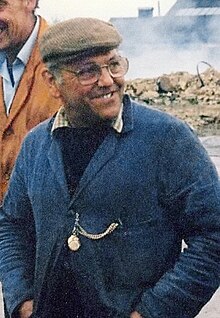Fred Dibnah
| Fred Dibnah MBE |
|
|---|---|

Dibnah in 1985
|
|
| Born |
Frederick Dibnah 28 April 1938 Bolton, Lancashire |
| Died | 6 November 2004 (aged 66) Bolton Hospice, Greater Manchester |
| Spouse(s) | Alison Foster (1967–85) Susan Lorenz (1987–96) Sheila Grundy (1998–2004 his death) |
| Children | Jayne, Lorna, Caroline Jack, Roger |
| Parent(s) | Frank and Betsy Dibnah |
| Engineering career | |
| Discipline | Television presenter, steeplejack and mechanical engineering |
| Awards | MBE, honorary Doctorates from Robert Gordon University and University of Birmingham |
Frederick "Fred" Dibnah MBE (28 April 1938 – 6 November 2004), born in Bolton, was an English steeplejack and television personality, with a keen interest in mechanical engineering.
When Dibnah was born, Britain relied heavily upon coal to fuel its industry. As a child he was fascinated by the steam engines which powered the many textile mills in Bolton, but he paid particular attention to chimneys and the men who worked on them. He began his working life as a joiner, before becoming a steeplejack. From age 22, he served for two years in the armed forces, as part of his national service. Once demobilised, he returned to steeplejacking but met with limited success until he was asked to repair Bolton's parish church. The resulting publicity provided a welcome boost to his business, ensuring he was almost never out of work.
In 1978, while making repairs to Bolton Town Hall, Dibnah was filmed by a regional BBC news crew. The BBC then commissioned an award-winning documentary, which followed the rough-hewn steeplejack as he worked on chimneys, interacted with his family and talked about his favourite hobby—steam. His Lancastrian manner and gentle, self-taught philosophical outlook, proved popular with viewers and he featured in a number of television programmes. Toward the end of his life, the decline of Britain's industry was mirrored by a decline in his steeplejacking business and Dibnah increasingly came to rely on after-dinner speaking for his income. In 1998, he presented a programme on Britain's industrial history and went on to present a number of series, largely concerned with the Industrial Revolution and its mechanical and architectural legacy.
He died from cancer in November 2004, aged 66. He is survived by his five children from three marriages.
Fred Dibnah was the son of Frank and Betsy Dibnah (née Travis), who were initially both employed at a bleach works. His mother later worked as a charwoman at a gas works. Named after his uncle Frederick, he was born on 28 April 1938 and brought up in the historic Lancashire town of Bolton, then a predominantly industrial town with a history in the spinning and weaving of cotton. As a child, Dibnah was fascinated by the sights and sounds of industry and the dozens of chimney stacks visible around Burnden Park, and paid particular attention to the steeplejacks he saw on his way to school. A popular pastime for local children was playing around the many mill lodges (industrial ponds) which once littered the area. An inventive child, Dibnah and some friends designed a makeshift diving suit from a crisp tin, a car inner tube and some piping. After being told to remove it from the local swimming baths, they tested it in one of the lodges, but were unsuccessful.
...
Wikipedia
